Commercial EV Charging Station
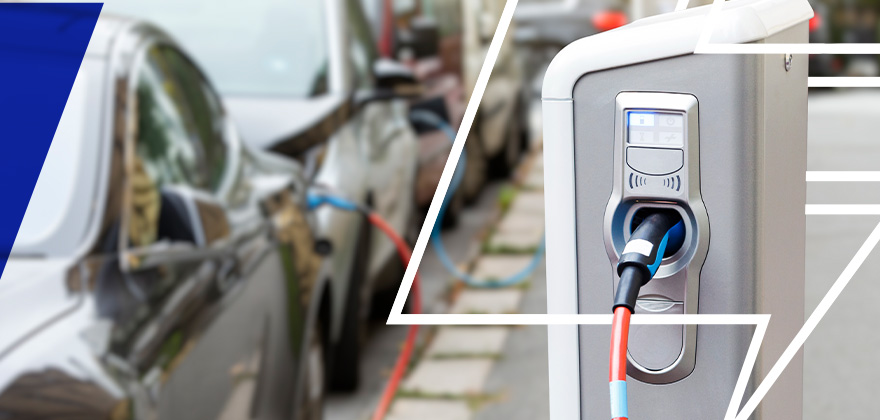
Lippolis Electric is committed to providing cutting-edge electrical solutions for businesses. Our commercial electric vehicle (EV) charging stations can drive your business traffic and improve transportation convenience. Discover the difference ChargePoint fast charging stations can make to your business today.
What Is EV Charging?
Electric vehicles need electricity to power movement. EVs use specialized charging stations to power up. These charging stations act like gas pumps for electric and hybrid vehicles, letting them drive to your business. EV owners can charge up at home or use specialized chargers at businesses. Residential chargers are usually slower and less powerful than commercial EV chargers since they’re meant for at-home use. Commercial EV charging stations offer faster charging for more people, encouraging traffic at businesses with dedicated EV chargers.
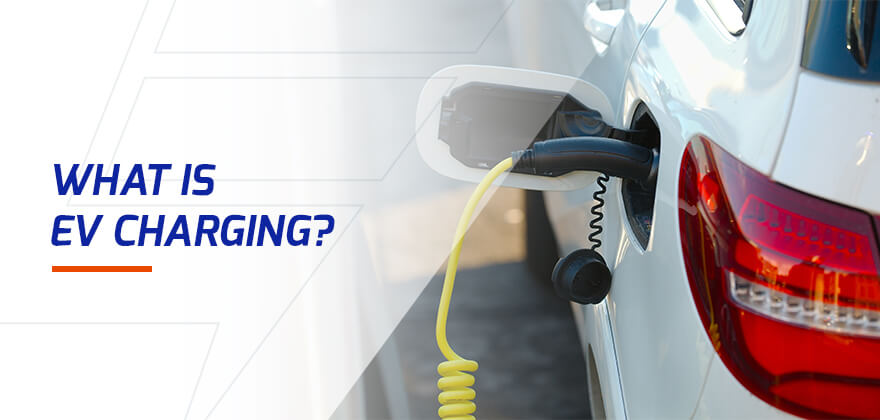
How EV Charging Works
EV chargers use alternating current (AC) or direct current (DC) to charge up vehicles.
ugging in your vehicle to an electric car charging station is simple. Once you plug in your car, the charger will pull an electrical current from a 240v outlet or directly from the power grid. A light on the charger or an internal display will indicate when your vehicle has finished charging.
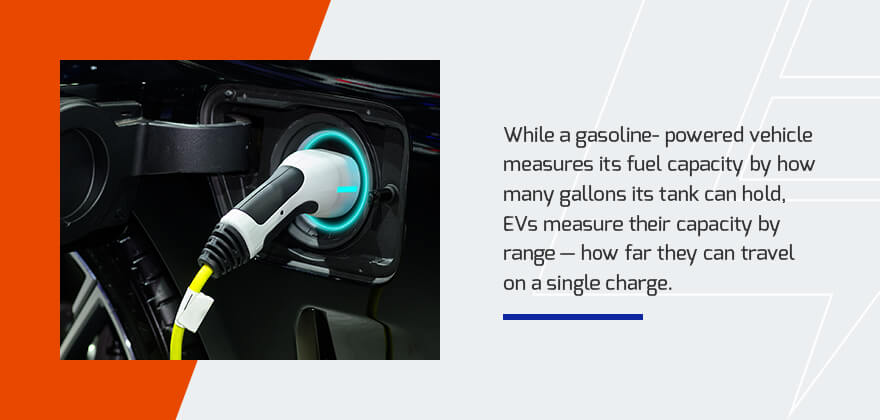
While a gasoline-powered vehicle measures its fuel capacity by how many gallons its tank can hold, EVs measure their capacity by range — how far they can travel on a single charge. An EV’s charging rate is represented in terms of distance over time. For example, you may be able to recharge the battery at 20 miles per hour.
EV Charger Levels
The three EV charger levels deliver different charging times and power, letting you pick the best option for your needs:
- Level 1: This is the most basic form of EV charging. Level 1 charges slowly while your vehicle sits at home. They’re used for overnight, multi-day, or stations that lack support for faster charging options. At 3 to 5 miles per hour, level one chargers provide the slowest charge out of all the levels. However, these chargers are more available than the other levels and can fulfill some people’s charging needs. An EV may require multiple days of charging to reach a full battery with a level one charger, so it’s not ideal for people who drive frequently. However, these chargers are a good option for people who can let their vehicle sit for longer between uses.
- Level 2: Level 2 chargers deliver power faster than Level 1 models. They can be used at home, work, or public parking spaces. These chargers are an excellent, affordable charging solution for EV owners who sleep or spend a day at the office. Level two chargers are easy to find, especially in cities and major highways. They fill your battery much more quickly at 12-80 miles per hour than level one chargers. Many EV owners will have a level two charger in their home or garage. Level two chargers can easily charge your vehicle overnight or during the workday, so you have a full battery when you wake up or get off your shift.
- Level 3: Level 3 chargers use DC to provide hyper-fast charging to vehicles. You’ll see these at businesses or along highways. They give drivers quick, efficient charging when they’re on the go and can’t wait around. With 3-20 miles per minute speeds, you can charge your EV in just a couple of hours or less. However, since level three charges so fast, they often cost the most. If you’re using a level three charger to fill your battery, you might pay as much as you would to refill a standard gas-powered vehicle. Most people who drive EVs don’t use these vehicles to take long road trips, so you probably won’t need to use a level three charger to fill your car. Instead, you can use these chargers to top off your battery. Some EVs are equipped to handle level three chargers and their voltage. Consult your manufacturer’s guide to determine if level three chargers suit your vehicle.
How Do EV Charging Stations Work?
Electric vehicle charging stations allow cars to regain their electric charge when their batteries run low. The vehicle connects to one of the chargers at the station, which in turn is connected to the electric grid.
How long it takes to charge an electric car varies across EV charging stations. Charging stations typically recharge vehicles much faster than personal garage chargers do — cars must sit at personal chargers for hours. However, charging a vehicle at an electric charging station still takes longer than filling a gas-powered car with gasoline. The driver must typically wait about 30 minutes or more while the battery slowly recharges.
The chargers at charging stations charge the battery only to about 80%. Receiving more charge so rapidly would stress the battery, and 80% is usually enough to get the person to the next destination. Once charged, a standard EV can usually travel about 250 miles before recharging, and Teslas may be able to travel closer to 350 miles.
How Much Does It Cost to Charge an EV?
Charging costs can vary based on your location. Some charging stations may be subscription-based or pay-as-you-go. The property owners, networks or EV charging station companies typically set the price.
Some EV manufacturers, such as Tesla or Nissan, provide complimentary public charging at some locations. Some states also offer rebates for public EV charging as they do for green energy and solar use. For example, California’s Clean Vehicle Rebate Program offers up to $7,000 to individuals who purchase zero-emission vehicles, including plug-in hybrids. These incentives can help offset the cost of charging your car in public spaces. Check the rebates and incentives available in your state to see how you can benefit.
How Long Does It Take To Charge An Electric Car?
Charging to a full battery can take anywhere between 20 minutes and 50 hours, depending on:
- Current battery status: It takes longer to charge an empty battery than a battery that still has half of its maximum charge.
- Battery size: Smaller batteries will charge more quickly than batteries with a larger capacity.
- Charging rates: Each EV has a peak charging rate and a charging curve — the fastest it can charge and how much power it draws over time. Similarly, each charging station has a maximum speed for delivering its charge. If you’re at a charging station with a lower rate than recommended for your vehicle, it will take longer to charge to full battery.
- Weather: Colder temperatures can slow charging speeds, even when using a rapid charger.
Why Invest in EV Charging Stations for Your Business?
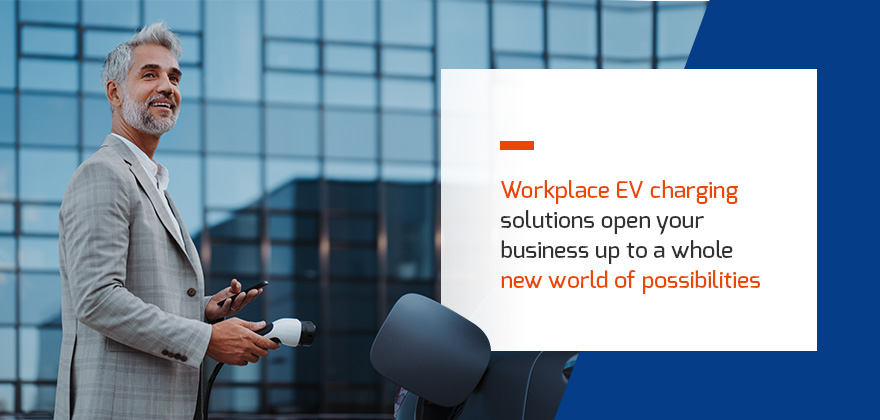
Workplace EV charging solutions open your business up to a whole new world of possibilities. EV charging stations make you more sustainable and accessible than ever. Install ChargePoint EV chargers with Lippolis Electric and enjoy these benefits:
- Attract new customers: Installing EV charges attracts a whole new demographic to your business. Eco-conscious customers will love having charging access whenever they visit your business. Providing EV charging stations lets your customers know you’re committed to sustainability and providing them with above-and-beyond service.
- Boost employee satisfaction: With EV charger installations, you’ll also create a happier workforce. Employees looking for sustainable commuting options can use your charging stations to fuel up before they hit the road. Offering commercial electric vehicle charging stations shows your dedication to employee well-being. You’ll create a more positive company culture while promoting different types of transportation accessibility.
- Embrace the future: Leap into the future with quality EV charging stations for your business. Plug-in hybrids (PHEV) saw a 60% increase in sales in 2023. Hybrid and fully electric vehicles offer drivers a way to reduce their gas costs. Installing EV charging stations shows everyone that your business is forward-thinking and invested in the Earth’s future.
- Maximize revenue: While parking lots are an excellent resource for employees and customers, yours could be something more. Transform your parking lot with EV charging stations. You’ll create a revenue-generating asset that increases your income while driving traffic to your business.
- Stay regulation-ready: As the market shifts and government regulations change, you need to adapt. Investing in EV chargers ensures your business remains compliant with changing environmental standards. You’ll reduce the chances of being caught off-guard by new initiatives and protect your long-term success.
Streamlined Consultation Process
At Lippolis Electric, we put your unique needs first. Our consultation process starts with a comprehensive assessment. We’ll look at your space, electrical infrastructure, budget and preferences. Our experts examine all this information and offer you a solution that fits your business.
Efficient Installation Services
With over 30 years of experience in electric installations, you can trust Lippolis Electric with your EV charger solutions. Our certified technicians specialize in ChargePoint charger units, ensuring you get fast, professional service. We handle every aspect of installation with unmatched precision and expertise.
Expert Fleet Charging Solutions
We offer ChargePoint chargers for businesses that need fast, efficient EV charging. Choose between AC and DC fast charging stations for your business:
- Level 2 AC: These alternate current charging stations add up to 40 miles of range per hour to electric vehicles. AC charging stations provide convenient charging for cars at your business.
- DC fast charging: Direct current or Level 3, chargers offer users rapid charging capabilities. Users can start driving in just 20 minutes with these high-power outputs.
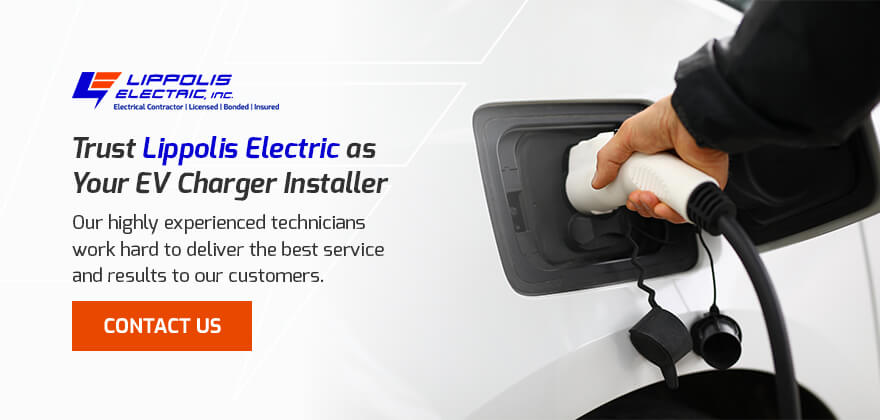
How Electric Vehicle Charging Stations Are Evolving
Because electric vehicle charging stations are so new, their technological capabilities are evolving rapidly. Here are a few of the improvements they have seen or will soon see in the future:
1. Expanded Networks
One of the most significant challenges with electronic vehicles is their range limitation. Most electric cars can drive only a modest distance before they require recharging. And with electric charging stations currently in low supply, taking an electric vehicle on a substantial journey is tricky. Even if you have charging stations close to home, you likely cannot take an electric car on a road trip if there won’t be any place to charge it once you get out of town.
How many EV charging stations are there in the United States? The latest numbers from the U.S. Department of Energy’s Alternative Fuels Data Center indicate that the United States has just over 27,000 charging stations with 89,000 individual charging outlets.
The electric car company Tesla has taken the lead on providing more charging stations, with plans to build 13,000 individual chargers around the world. And since Tesla’s charging stations, known as Superchargers, work only with Tesla’s vehicles, other EV companies are following suit with construction projects of their own, slowly expanding EV charging networks across the country.
The company ChargePoint has added more than 66,000 charging spots, and EVgo has added 1,200 fast chargers. Volkswagon, through a spinoff company known as Electrify America, plans to spend $2 billion to develop a reliable network of electric charging infrastructure as part of a settlement reached with U.S. regulators over the company’s auto emission scandal.
2. Reduced Charging Deserts
“Charging deserts” refers to the current lack of charging stations over large areas. Even in big cities, some areas lack the electronic charging stations that would make driving an electric vehicle more convenient. Many city-dwellers who live in apartments, condos or townhomes also lack access to personal garages where they could charge their cars.
According to U.S. Census Bureau numbers from 2000, the last year for which we have available data, only 60% of Americans live in detached, single-family homes where personal chargers would be realistic. And residents who do not live in single-family homes may not necessarily live close to charging stations or may find them too expensive because the single available station can charge high prices. In areas without charging access, this hurdle prevents some car buyers from purchasing electric vehicles.
Network expansion plans have focused more on highway access than on urban settings. But that may soon change. In New York, for example, Governor Andrew Cuomo has a $250-million plan to build charging hubs in locations throughout New York City and the rest of the state. Permitting can raise costs, and the electric grid will need to find a way to accommodate the increased demand for energy. But charging locations may soon become more common sights throughout many cities and more convenient and affordable for residents.
3. Faster Charging
Often, electric vehicles charge slowly, over a matter of hours, while parked for the night or potentially at the owner’s workplace. Drivers need more rapid options for road trips so they can charge the battery quickly and get back on the road.
Faster charging is on the way. Already, fast chargers can give a vehicle 90 miles of range in 30 minutes. This is still slower than filling up at the gas pump, but it is much quicker than waiting hours. Electrify America’s planned charging stations will be even faster, potentially giving cars 20 miles of range per minute of charging time.
4. Alternative Charging Methods
How else are electric car chargers changing? Innovations in how electric vehicles charge are likely to make them more convenient in the future. Below are a few alternative charging methods and the reasons why these new EV charging station trends are advantageous:
- Bidirectional charging: Bidirectional charging allows the charge to flow both ways — from the electric grid into the car, as usual, or from the car into the electric grid in a process known as vehicle-to-grid (V2G) energy transfer. At times of peak energy demand, vehicle owners can send energy back into the grid and receive payment for it. This strategy helps alleviate the supply challenges that arise as more electric vehicles hit the road and require electric power.
- Solar charging: We often think of rooftop solar power or the ground arrays that power homes and businesses, but solar energy can also help power vehicles. Some methods of solar charging use chargers that convert solar energy to electric energy. Others affix solar panels to the vehicle’s roof and use them to supply some of the required power.
- Wireless charging: Wireless charging allows cars to charge without wires or cables connecting to an outlet. Drivers merely park on a spot and start charging. Wireless charging eliminates the necessity for building and installing certain infrastructure and may be especially valuable for large-scale charging needs. This could also be helpful for fleets of autonomous vehicles that won’t have drivers to plug them in.
- Autonomous robotic charging: Autonomous robotic charging may solve the difficulties of building enough charging infrastructure. This innovative charging method will use robotic arms to make charging more convenient. Drivers can merely sit and relax as the robot attends to the car’s charging needs.
Why Choose Lippolis Electric for Business EV Charging Stations?
Lippolis Electric is your premier choice for commercial EV charging services in the tri-state area. With a highly experienced team and a comprehensive range of services, we can deliver the right solution for the job. Choose our ChargePoint installation services and enjoy exceptional reliability and charging.
Experienced Team
Our seasoned team of commercial electricians is equipped with professional-grade equipment and extensive experience. We can handle EV charging projects and beyond of all sizes and complexities. Whether you need new installations or repairs, our experts ensure your electrical infrastructure is optimized for the job.
Specialized Services
At Lippolis Electric, we understand the importance of safety. We follow electrical codes and regulations to ensure you get safe, effective installations. From low-voltage systems to specialized installations, we deliver meticulous craftsmanship every time.
Seamless Integration
As sustainability advocates, we want to help you push your energy efforts into the future. We offer commercial EV charging stations to help reduce your reliance on gas. Additionally, we provide specialized commercial solar panel installation services to help you transition your business to renewable energy sources. Our tailored solutions support your commitment to the environment while reducing operational costs.
Reliable Support
With our 24/7 emergency repair services and proactive generator maintenance programs, we help minimize your electrical downtime. Lippolis Electric’s dedicated technicians are committed to enhancing safety and improving your business’s productivity.
Choose Lippolis Electric for Your Commercial EV Charging Stations
If you’re interested in upgrading your business’s charging capabilities, reach out to us online. Lippolis Electric is ready to help you take the next step in sustainability and efficient charging. With our commitment to quality, customer service and reliability, you can be sure you’ll get easy, effective EV charging station integration. Explore our range of commercial electric services or contact us online for a free consultation today!
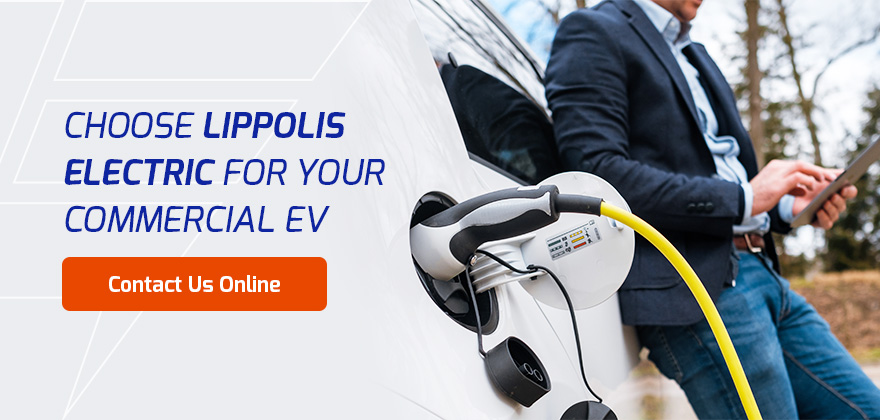
Schedule service
Please note that your appointment is not set until confirmed by Lippolis Electric shortly after you've submitted the form.
| ‹ | › | |||||
| Sun | Mon | Tue | Wed | Thu | Fri | Sat |
